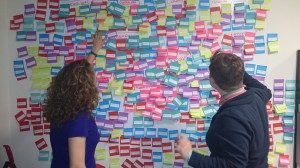 Hedge Funds Care/Help for Children, has provided $40,000 for the continued development of the Handling Intense Emotions curriculum at Lawrence Hall. This financial services-based foundation funds innovative child welfare programming. Many thanks to the folks at both Lawrence Hall and HFC.
Hedge Funds Care/Help for Children, has provided $40,000 for the continued development of the Handling Intense Emotions curriculum at Lawrence Hall. This financial services-based foundation funds innovative child welfare programming. Many thanks to the folks at both Lawrence Hall and HFC.
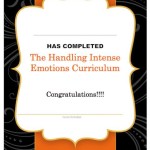 Congratulations to the first graduates of the Handling Intense Emotions curriculum. And congratulations to faciltators Kim Lienhop and Rachel Waggoner. Many thanks for all the great feedback from everyone at Lawrence Hall on how best to improve the curriculum. Savannah Felix has been hard at work making these improvements before the next group begins. Another milestone reached!
Congratulations to the first graduates of the Handling Intense Emotions curriculum. And congratulations to faciltators Kim Lienhop and Rachel Waggoner. Many thanks for all the great feedback from everyone at Lawrence Hall on how best to improve the curriculum. Savannah Felix has been hard at work making these improvements before the next group begins. Another milestone reached!
 The Handling Intense Emotions intervention started from a need discovered while running a pilot trial of a treatment foster care program. A paper describing that program and the need for a supplement to address intense emotion outbursts was published last month in the journal Child and Adolescent Psychiatry and Mental Health. A large team of folks helped on that paper and I am grateful to them all.
The Handling Intense Emotions intervention started from a need discovered while running a pilot trial of a treatment foster care program. A paper describing that program and the need for a supplement to address intense emotion outbursts was published last month in the journal Child and Adolescent Psychiatry and Mental Health. A large team of folks helped on that paper and I am grateful to them all.
Our two efforts to identify de-escalation strategies have struck gold amidst a mountain of muck. In one project led by Jill Spielfogel, professionals across disciplines nominated over 300 de-escalation strategies. We culled these down to about 90. Twenty-nine brave souls volunteered to sort and rate these strategies. Jill is now analyzing the data using concept mapping software.
Meanwhile, our effort to compile de-escalation strategies from the peer reviewed literature yielded over 1000 strategies, including duplicates!! In this photo, Jill and Sav Felix are seen in our initial efforts to make sense of them. We printed each one on a post it and started moving the post-its around my office wall. Yikes! This is old school data analysis.
Two sorting stages later, it is beginning to make sense. We have learned an amazing amount during these past few months. We can’t wait to get these efforts into a format that we can disseminate and eventually add into the Handling Intense Emotions curriculum.
 As part of the Handling Intense Emotions curriculum, we provide a number of strategies for caregivers to use in the moment with young people who are in the midst of an emotion episode. As we developed the intervention, we began to wonder what people in other professions use to handle such episodes.
As part of the Handling Intense Emotions curriculum, we provide a number of strategies for caregivers to use in the moment with young people who are in the midst of an emotion episode. As we developed the intervention, we began to wonder what people in other professions use to handle such episodes.
How do we train flight attendants to handle upset people? What do customer service representatives say to calm down upset callers? What do hostage negotiators do?
We are going to find out. Jill Spielfogel and I are launching a research project to query all kinds of professionals and experts from various disciplines to find out their de-escalation strategies. We will then use these experts to compile and categorize these strategies. Hopefully, we can all learn from one another. If you know of someone we should query, let us know!
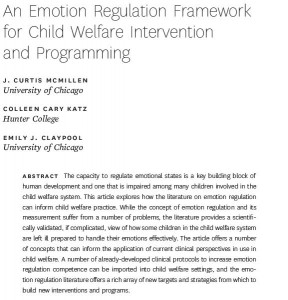 Social Service Review published an overview of emotion regulation for child welfare services in its September issue. Emily Claypool, Colleen Cary Katz and I wrote the paper while we were developing the Handling Intense Emotions curriculum. The paper contains most of the theoretical thinking that went into the curriculum. It is likely the best source for understanding why we created the intervention we did.
Social Service Review published an overview of emotion regulation for child welfare services in its September issue. Emily Claypool, Colleen Cary Katz and I wrote the paper while we were developing the Handling Intense Emotions curriculum. The paper contains most of the theoretical thinking that went into the curriculum. It is likely the best source for understanding why we created the intervention we did.
![LH_building[1]](https://www.handlingintenseemotions.com/wp-content/uploads/2014/07/LH_building1-300x140.png) The first use of the Handling Intense Emotions curriculum is now underway. One group living unit at Lawrence Hall Youth Services in Chicago has begun using the curriculum. The group home staff was trained in mid-June and a Handling Intense Emotions group for young people was initiated the next week. This initial implementation will be used to help refine the intervention and the implementation plans prior to the launch of a pilot of the intervention with a research study wrapped around it.
The first use of the Handling Intense Emotions curriculum is now underway. One group living unit at Lawrence Hall Youth Services in Chicago has begun using the curriculum. The group home staff was trained in mid-June and a Handling Intense Emotions group for young people was initiated the next week. This initial implementation will be used to help refine the intervention and the implementation plans prior to the launch of a pilot of the intervention with a research study wrapped around it.
We already have one lessoned learned. Some of the direct care staff thought that the validation plus skills sounded a little too therapy-ish. They see their role as bring the “real people” in these kids lives and worry about sounding like therapists. Here is what i wish I had told them. “In this job, you are sometimes asked to be a little like guardian angels. You are asked to quietly protect these youth. Sometimes, you are asked to a little like detectives, to find out what is going on with these young people. And sometimes you are asked to be a little like therapists. Yes, you need to be able to master the validation plus skills to make them sound like you. But it is OK to sound a little bit like a therapist some times.”
We have new versions of every Handling Intense Emotions manual now available for our stakeholders to use and review. We have also uploaded the digitized content for all learning modules for both youth and caregivers. All of these materials can be found on the curriculum and manuals tab. This material is password protected. We don’t want the non-piloted version of these materials to be distributed at this time. But they are available for preview at the discretion of Curtis McMillen for potential agency representatives interested in piloting the curriculum. This includes our development partners at Lawrence Hall Youth Services in Chicago.
Presented what I have learned putting together the Handling Intense Emotions curriculum to 12 seasoned social workers on Friday Nov 22 at a continuing education event hosted at Hamburger University by the University of Chicago. Technical glitches abounded, not with the Articulate Storyline software used to create the digitized portion of the curriculum, but the general old fashioned kind, getting the sound of a computer and out into the world. There are pitfalls to a curriuculum that uses digitized media. It raised a question: Do we need to build an analog back-up to Handling Intense Emotions.
Feedback-wise, it was a mixed set of opinions. One woman who works with a completely different population — medical students from low income communities — loved the validation and validation plus skills and saw how they could be used with stressed out young docs. “Of course you are overwhelmed. Who wouldn’t be?”
A very seasoned children’s services social worker chafed at my assertion that we were putting too much emphasis on trauma and not enough emphasis on other factors that contribute to children’s development. The trauma folks –and I consider myself one — are having their day in the spotlight. Trauma is finally being recognized for the harmful role it plays in our most difficult communities, neighborhoods and families. They don’t want the spotlight going elsewhere.
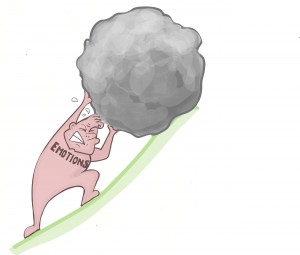 At the same time, she thought we should not shy away from the psychoeducation in module 2 for youth. Some youth found the material demoralizing as it points out the disadvantages some youth must cope with in life. She felt strongly that it needed to be in the curriculum to help youth see that their emotional make-up makes sense.
At the same time, she thought we should not shy away from the psychoeducation in module 2 for youth. Some youth found the material demoralizing as it points out the disadvantages some youth must cope with in life. She felt strongly that it needed to be in the curriculum to help youth see that their emotional make-up makes sense.
Meanwhile, the module 4 faciliation manual for youth was completed. We are making progress!
November 2013. Rewrites of the manuals, with full HIE formatting, slows. It is a slog.
September 2013. A full rewrite of the manuals begins.
September 2013. Jazzalyn completes work on the module for lifestyle changes and preventing emotion episodes.
August 2013. We decide to split out the Dear-Man work and make it its own module. We move from 9 to ten modules.
August 2013. Kassandra Renteria, who plays a new character for Handling Intense Emotions, does a photo shoot and sound booth work. SSA allows us to shoot in the school cafeteria. Thanks, Keith Madderom!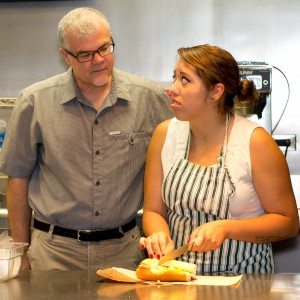
August 2013. Hired Jazzalyn Lamadora to work on the intervention. Jazzalyn is a former foster youth who moved this summer to Chicago to start gradaute school at the University of Chicago.
July 2013: Presented the origins and justifications behind Handling Intense Emotions at the Family Foster Treatment Association (FFTA) annual conference in Nashville. I was heartened by the response from treatment foster care professionals who saw the need for the intervention and appreciated the intervention approach. I enjoyed the conference, learned a lot and hope to return.
July 2013. Katara Watkins, doctoral candidate in counseling psychology at Howard completes a draft of a faciltiation guide for the Handling Intense Emotions groups for youth. She completes her internship at Lawrence Hall and heads back to DC to do her dissertation work. Godspeed, Katara!
June 2013: Our three student workers, Emily Claypool, Andy Wheeler and Mercedes Williams graduated from the University of Chicago with masters degress in social work. Great jobs awaited them and we will miss them. Andy reports he is already using skills we teach in his work with trauma survivors. Emily reports that she is seeing intense emotions everywhere she looks as a crisis response social worker for a mental health agency.
 June 2013. Mercedes returns to the project to do a photo shoot to complement her acting for the scenes related to problem solving.
June 2013. Mercedes returns to the project to do a photo shoot to complement her acting for the scenes related to problem solving.
June 2013: We do some new sound recording and photos with Cipriano Cahue, who plays Carlos in our digitized material for Handling Intense Emotions. France Jean Baptiste, narrator extraordinaire, comes back for another day in the Sound Booth.
May 2013. Young people from the foster care system (all age 18 or over) are walked through all of the learning modules. They rate how much each scene held their attention and how much they learned. We decide we need to re-write and re-produce some material and add new characters. They pay attention whenever there is a foster youth involved in a storyline or is the narrator. Emily begins the rewrites.
